When will Arabs enjoy true democracy?
From Tunisia to Egypt, from Iraq to Syria, there is little to indicate that the Arab world is destined for a democratic future anytime soon. The simple fact is that societies of the “Arab Spring” have not had the democratic traditions that could facilitate an easy transition to this kind of a system.
This situation is not part of the unalterable “social genetics” of these nations, of course. It just means that democracy, as understood in advanced societies, will need serious time to flourish in the Arab world. Contrary to the self-congratulation of current-day Europeans concerning their democracies, democracy did not come easily to Europe either. In most cases, it only came after the bloody events of World War II.
Not all Arab countries have similar backgrounds, of course. Tunisia, for example, is better off than Egypt, relatively speaking, since it did have political parties, trade unions, a wealthier population and a broader middle class.
This, however, did not prevent it from being run by a dictator for nearly a quarter of a century until 2010. As for today, we see political unrest developing that could stymie efforts to establish true democracy in that country.
Ekmeleddin İhsanoğlu, the head of the Organization of Islamic Cooperation (OIC), who was born in Egypt to Turkish parents and holds a masters of science degree from the Islamic Al-Azhar University in Cairo, is also of the opinion that democracy should not be expected overnight in the Middle East and North Africa.
In an interview with daily Hürriyet on Monday, İhsanoğlu indicated that most initial assessments about the Arab Spring, especially with relation to Egypt, were “superficial,” to use his word.
“If you take Egypt, for example, there was nothing to mention as a political party over these past 60 years. Freedom of expression; freedom of assembly – none of these existed,” according to İhsanoğlu, who went on to declare that the only thing that united the people gathered in Tahrir Square at the time was a desire to see the regime go.
İhsanoğlu added that the situation in Egypt today resembles the situation in Turkey in 1908, when Sultan Abdülhamit was deposed by a diverse group of nationalists, Islamists, and members of different ethnic groups, who were united only in their desire to see the sultan go.
Abdülhamit did go after the “Young Turk revolution,” but that was also the start of years of political turmoil, as different groups vied for power, and the whole crisis ended in the “İttihadist” dictatorship that led the empire to war and desolation out of which the Turkish Republic eventually emerged.
İhsanoğlu believes that democratic stability in a country like Egypt will most likely come only after two full terms of Parliament, because the opposing political movements necessary for a true democracy have yet to emerge. As for religious-political groups like the Muslim Brotherhood, these already existed as Islamic social groups, according to him, and were organized to provide charity, education and health for the poor.
He says these groups managed to convert themselves into political parties overnight, and came to power in the first round of attempts at democracy following the Arab Spring because their existing organizations that facilitated this.
What İhsanoğlu says presupposes that the Arab Spring will not be hijacked in the name of security and stability by one group or another – be it Islamist or otherwise – and that elections for new parliaments will be held in the foreseeable future. Developments, suggest that this expectation might be overoptimistic.
It could also be that true democracy in the region emerges, not after “two parliaments,” but after bloody events or new dictatorships that leave exhausted societies with little choice in the end, as was the case in most of Europe.
So the answer to the question, “When will Arabs enjoy true democracy?” seems to be, “Not for some time yet.”











